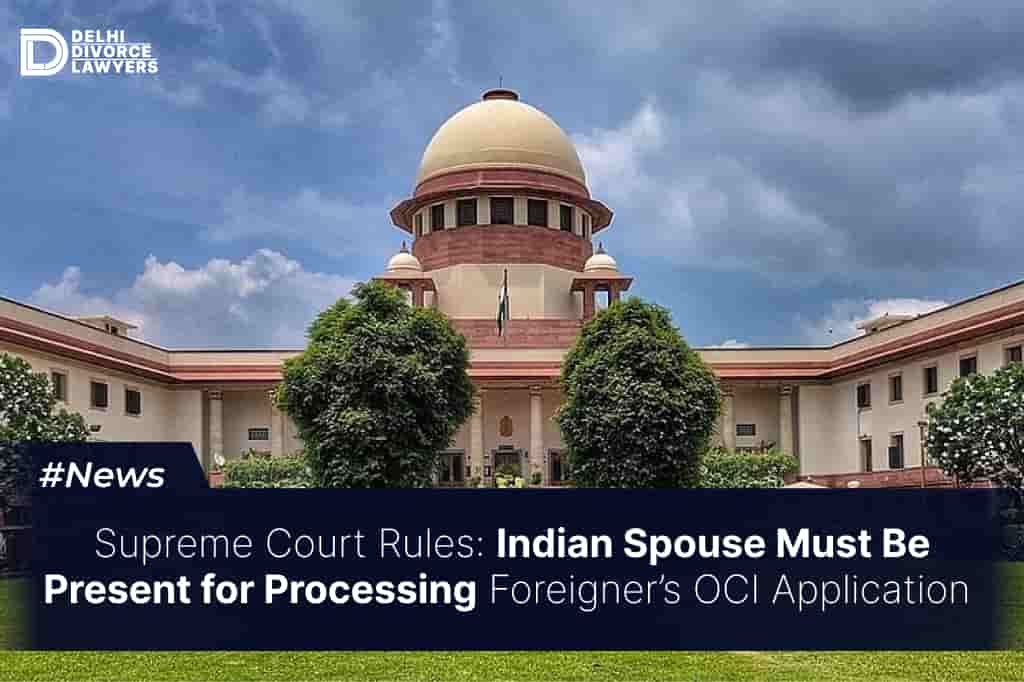The Court explained that the Visa Manual, 2021 mandated the presence of the Indian spouse for an interview by the authorities to ascertain that it was not a sham marriage.
The Supreme Court recently ruled that the physical or virtual presence of an Indian spouse, even in cases of estrangement, is essential for the proper processing of an Overseas Citizen of India (OCI) Card application filed by a foreign spouse [Union of India v. Bahareh Bakshi]. A three-judge bench comprising Justices Hrishikesh Roy, Sudhanshu Dhulia, and SVN Bhatti highlighted that Paragraph 21.25 (vi) of the 2021 Visa Manual requires the Indian spouse to attend an interview with authorities to confirm the authenticity of the marriage and ensure it is not one of convenience.
“During the personal interview of the applicant, the concerned Officer may put random questions to the foreign applicant and his/her spouse separately, to elicit information which may help in ascertaining the genuineness of the marital status of the applicant. This suggests that the presence of the spouse of the applicant either physically or through the virtual mode is mandatory for effective consideration of the application for an OCI Card,“ the Court observed in its August 22 judgment.
The Court was addressing the case of an Iranian national who married an Indian man in 2009. As their relationship deteriorated over time, the woman applied for an OCI card in 2020. However, she was informed that her Indian husband’s presence was necessary to process the application. Seeking relief, she approached the Delhi High Court, where both a single judge and a Division Bench ruled in her favor, finding it unreasonable to require her estranged husband’s presence for the OCI card process. The Central government appealed these rulings to the Supreme Court, which ultimately found that the Delhi High Court’s decision lacked legal basis.
“Section 7A(1) (of the Citizenship Act, 1955) specifically notes that the registration of OCI Card by the Central Government is ‘subject to such conditions, restrictions and manner as may be prescribed’. Therefore, the Act clearly allows for supplementary procedures, such as an interview as specified in the Visa Manual as well as the Checklist. In the absence of any challenge to the visa manual or the checklist, and ignoring the procedure in place, the High Court in the impugned judgment erred in granting the relief of dispensing with the requirement of physical/virtual presence of the spouse,” the top court said.
The Court further noted that the High Court was unjustified in describing the requirement for the husband’s physical presence as ‘arbitrary.’ The Supreme Court stressed that, since there was no challenge to the provisions of the Citizenship Act 1955, the Visa Manual, administrative instructions, or the checklist, the High Court’s comments were unwarranted.
“The physical/virtual presence of the spouse other conditions are also to be satisfied by an applicant as is provided under the Citizenship Act 1955, the checklist and the Visa Manual for which even a declaration by the husband may be necessary,” it added.
The Court clarified that the Central government has the discretion to issue the woman an OCI card without requiring her estranged husband’s presence. The Court highlighted that under Section 7A(3) of the Citizenship Act, the Central Government has the authority to register a person as an OCI holder if special circumstances are found. This observation was made in response to the woman’s claim that her husband had abandoned her and might not agree to be present during the OCI application process.
“The present order will not come in the way of the Central Government to consider if any special circumstances exists for consideration of the respondent’s (woman-applicant) application and it will then be open for the respondent to make good her case,” the Court, therefore, ordered.

